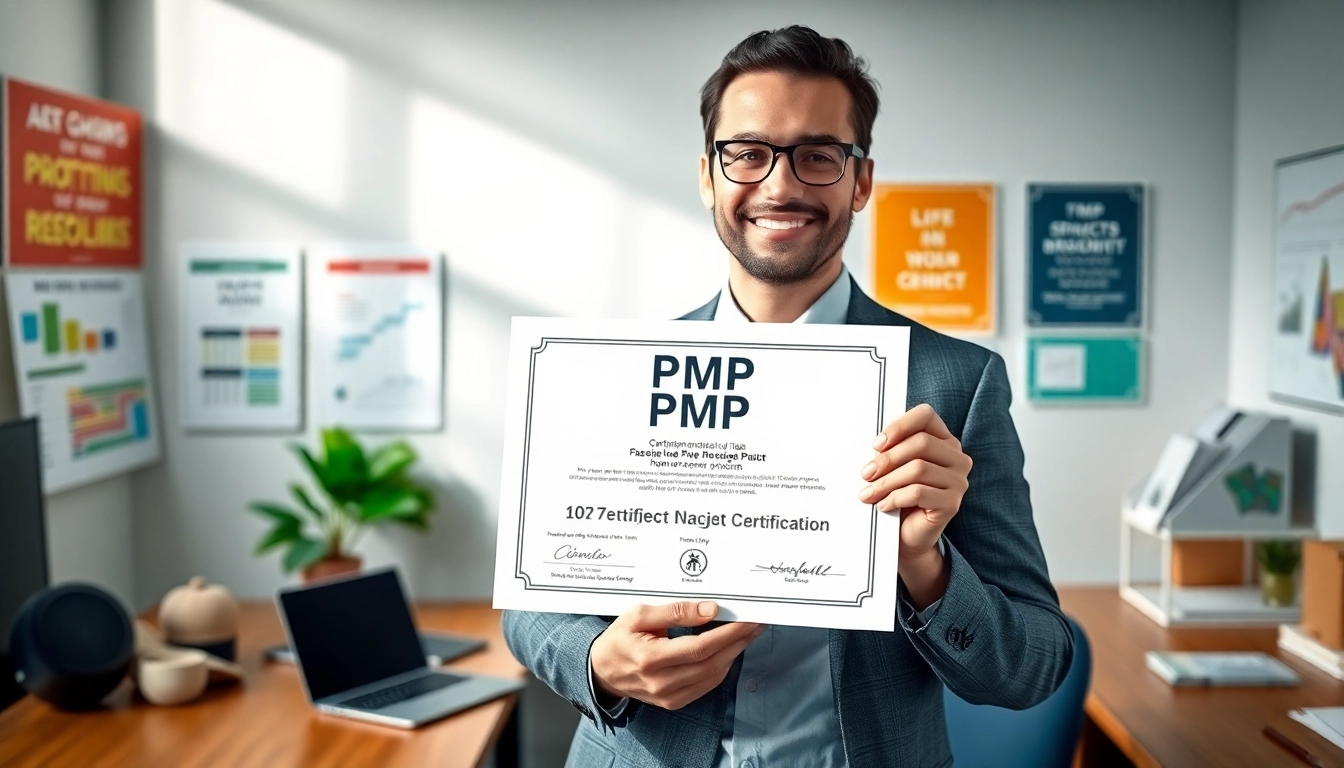What is PMP Certification?
Definition and Overview
Project Management Professional (PMP) certification is a globally recognized credential, offered by the Project Management Institute (PMI), designed to validate an individual’s competence in project management. It certifies that a project manager possesses the skills necessary to lead and direct projects and teams. The PMP certification is widely regarded as a gold standard in project management and signifies a certain level of experience, education, and proficiency in the field.
Obtaining this certification can enhance a project manager’s career trajectory and increase earning potential by demonstrating advanced skills in managing projects effectively. For further information on understanding the nuances of what is pmp certification, one can explore various resources including PMI’s official website and professional development courses.
Eligibility Requirements
The eligibility criteria for PMP certification are designed to ensure that candidates have the necessary educational background and professional experience. Prospective candidates must meet one of the following eligibility requirements:
- Having a four-year degree, along with at least 36 months of experience leading projects, and 35 hours of project management education.
- Alternatively, candidates can qualify with a high school diploma (or equivalent) and at least 60 months of project management experience, along with 35 hours of project management education.
These requirements ensure that only candidates with adequate experience and knowledge in project management can take the certification exam, thus maintaining the prestige of the PMP credential.
Benefits of PMP Certification
Achieving PMP certification confers numerous benefits to project managers and their organizations:
- Enhanced Job Opportunities: Employers often prefer PMP-certified professionals for project management roles, making candidates more competitive in the job market.
- Increased Salary Potential: PMP-certified project managers typically earn higher salaries compared to non-certified counterparts. According to PMI’s salary survey, PMP certification can increase earning potential by up to 20%.
- Global Recognition: PMP certification is recognized worldwide, providing opportunities for project managers to work in various industries and countries.
- Improved Skills and Knowledge: Preparing for the PMP exam enhances a project manager’s skills, promoting best practices and methodologies that can be applied in real-world scenarios.
- Networking Opportunities: Being a part of PMI’s global community allows certified PMPs to connect with other professionals, share knowledge, and explore new opportunities.
The PMP Certification Process
Application Steps
The application process for PMP certification involves several well-defined steps:
- Review Eligibility Requirements: Before applying, ensure you meet the eligibility criteria regarding educational background and project management experience.
- Gather Documentation: Compile documents such as transcripts, proof of project management experience, and details of completed project management education.
- Complete the Application Form: Fill out the PMP application form available on the PMI website, detailing your experience and education.
- Pay the Fee: Upon successful submission, pay the required examination fee, which varies for PMI members and non-members.
- Schedule the Exam: Once your application is approved, you can schedule your exam through the PMI website.
Exam Preparation Strategies
Preparing for the PMP exam requires a systematic approach. Here are some effective strategies:
- Understand the Exam Format: Familiarize yourself with the exam format, which consists of 180 questions covering various project management domains.
- Create a Study Plan: Develop a study schedule that allocates sufficient time to cover all topics in the PMBOK Guide and other resources.
- Join Study Groups: Collaborate with fellow candidates in study groups to deepen understanding and gain different perspectives on project management concepts.
- Utilize Practice Exams: Take practice tests to assess your knowledge and identify areas needing further study.
- Incorporate Real-World Examples: Relate theoretical concepts to practical scenarios, enhancing your ability to apply knowledge in real-life situations.
Resources for Study
Utilizing the right resources can make a significant difference in your exam preparation:
- PMBOK Guide: The Project Management Body of Knowledge (PMBOK) Guide is essential reading and serves as the basis for the exam.
- Online Courses: Many platforms offer comprehensive PMP exam prep courses, including Coursera, Udemy, and PMI.
- Books: Consider additional texts such as “PMP Exam Prep” by Rita Mulcahy for helpful strategies and information.
- Mobile Apps: Use mobile applications designed for PMP study, which can be convenient for learning on the go.
- PMP Community Forums: Engage with online forums and communities where you can ask questions and share tips with other candidates.
Real-World Applications of PMP Certification
Industries That Value PMP Certification
PMP certification is not limited to one specific sector; it spans multiple industries including:
- Information Technology: Many IT companies prefer PMP-certified project managers to ensure efficient project delivery.
- Construction: The construction industry relies heavily on project managers to oversee complex projects from conception to completion.
- Healthcare: With the rise of healthcare projects, certified PMPs facilitate the execution of critical healthcare initiatives.
- Finance: In the finance sector, project managers are essential in managing projects related to compliance, technology upgrades, and more.
Case Studies and Success Stories
Case studies highlight the significant impact of PMP certification:
One notable instance is a large-scale IT project that was initially behind schedule and over budget. After hiring a PMP-certified project manager, the project saw a turnaround, resulting in timely completion and improved budget management. This success underscored the importance of effective project leadership and the application of methodologies learned through PMP coursework.
Another example involves a healthcare organization that underwent a massive transition. By employing PMP-certified project managers, they effectively streamlined the process, ensured compliance with regulations, and delivered their services efficiently.
The Role of Certified PMPs in Organizations
CERTIFIED Project Management Professionals play a crucial role in organizations by:
- Establishing Standards: They introduce consistent processes and best practices across all projects, enhancing overall performance.
- Risk Management: Certified PMPs effectively identify and mitigate risks before they escalate, ensuring project success.
- Stakeholder Communication: They facilitate communication between stakeholders, ensuring everyone is aligned with the project’s objectives.
- Team Leadership: PMPs lead diverse teams, wielding their expertise to motivate and drive team performance towards shared goals.
Challenges in Obtaining PMP Certification
Common Pitfalls to Avoid
While pursuing PMP certification is rewarding, candidates may face several challenges:
- Inadequate Study Time: Many candidates underestimate the time required to prepare properly. Establishing a robust study plan is paramount.
- Neglecting Experience Documentation: Failing to accurately document project management experience can lead to application rejection; attention to detail is key.
- Overreliance on Single Source of Study Material: Diversifying study resources can provide a wider understanding of concepts and principles.
Managing Study Time Effectively
Time management is essential when preparing for the PMP exam. Consider the following approaches:
- Prioritize Learning Goals: Identify areas where you need more focus and allocate time accordingly.
- Establish a Routine: Set aside consistent blocks of time each week dedicated exclusively to studying.
- Utilize Productivity Techniques: Techniques such as the Pomodoro Technique can help maintain focus and enhance retention of material.
Overcoming Exam Anxiety
Many candidates feel anxious when approaching the PMP exam. Here are strategies to alleviate anxiety:
- Practice Mindfulness: Engage in mindfulness or meditation exercises to calm the mind and reduce stress levels.
- Simulate Exam Conditions: Take full-length practice exams in a quiet environment to replicate exam day conditions.
- Positive Visualization: Visualize yourself successfully completing the exam to build confidence and reduce nerves.
The Future of PMP Certification
Trends in Project Management Certification
The landscape of project management is evolving, influenced by technology and new methodologies. Trends shaping the future include:
- Agile Methodologies: There is a growing emphasis on agile project management techniques, necessitating additional training in these areas for PMP candidates.
- Digital Transformation: The integration of technology in project management tools is on the rise, with PMP candidates needing to adapt to these innovations.
- Sustainability and Social Responsibility: Increasing focus on environmental sustainability is leading project managers to incorporate sustainable practices into project planning.
The Evolving Role of the Project Manager
As industries change, so do the roles and responsibilities of project managers. Future PMPs are expected to:
- Embrace Technology: Adapt to digital tools and solutions that facilitate project management.
- Lead with Emotional Intelligence: Develop soft skills to better manage teams and stakeholder relationships.
- Promote Motivation and Team Engagement: Foster a positive work environment that encourages collaboration and innovation.
Continual Learning and Certifying Bodies
Continuous education is essential for PMP-certified professionals. The PMI encourages ongoing learning through:
- Professional Development Units (PDUs): PMPs must earn PDUs through workshops, seminars, or educational courses to maintain certification.
- Networking Opportunities: Engaging with local PMI chapters and attending global conferences can provide valuable insights and learning.
- Staying Updated on Best Practices: Regularly updating skills and knowledge base is crucial to remain relevant in a rapidly changing field.



